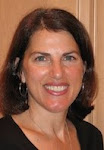During the past month, I learned more than I thought I ever wanted to know about hospital health care, and have thought about some small changes that could make a difference in helping people heal. Even with the purported best accomodations and intentions, it is still the case that our Western medical system sees the patient as a "care-receiver" and does not think more broadly about how to help each individual heal in the fastest way possible.
I recently spent 2 nights in Greenwich Hospital, which is a modern, beautiful, upscale facility. Many call it the "country club" of hospitals. Two days later, my mother was admitted to Lenox Hill Hospital in Manhattan, where I had the opportunity, over a 15-day period, to see another system at work. Perhaps due to my own recent experience, and my involvement as a Board member at Sarah Neuman in Mamaroneck (the Westchester campus of Jewish Home Lifecare which provides long-term, rehabilitation and home care), I felt slightly detached, and was able to watch and observe what was happening around me.
Here is some of what I learned, and I hope it may be of help if you ever find yourself in a position where either you or a loved one is in the hospital.
1. For the most part, doctors care very much about their patients, and want to understand patients' symptoms and have them get better as quickly as possible.
2. Many nurses are in their profession because they are caring individuals, and they tend to their patients efficiently and with compassion. However, there are those who see their work solely as a "job," and their patients know it almost immediately. These nurses leave call bells unanswered, do not get to know their patients, and either do tasks too quickly (and often painfully) or leave procedures for the next nurse to attend to. While these discrepancies are true of most professions, in a hospital, these differences can have a profound effect on the physical, emotional and mental well-being of the patient.
3. Some hospitals rotate doctors so that the patient rarely sees the same doctors unless the patient is there for an extended period of time. This was my experience, but my mother had a team of doctors she saw regularly. There were some other interns, residents and doctors on occasion, but she got to know her doctors and THEY GOT TO KNOW HER. I cannot stress the importance of this.
How many times did I need to repeat my "story?" In the two days I was in the hospital, I must have repeated it 5 or 6 times, once being awakened in the wee hours of the morning by an intern who probably had to get "just one more history" before her shift ended.
4. Which leads to the fact that it is virtually impossible to get a good night's sleep in the hospital. We have all heard this. From a healing perspective, it is essential for the body to rest in order to mend. My mother was awakened countless times from a deep sleep. Many times it was to monitor blood pressure or temperature, but there were other times the nurse could have used discretion and allowed her to get the rest she needed.
5. There is little to no understanding or connection between nutrition and health in a hospital. My roommate was a diabetic, and when she could finally have a meal of clear liquids, everything on her tray was loaded with sugar (jello, ices, fruit juice, etc.) Especially for people trying to recover from infection, sugar is something to be avoided. While hospital food, in general, can be very unappetizing, if you get to know the person taking the orders for meals, you can often request certain dishes more to your liking which are not on that day's menu.
6. Communication between medical personnel and patients is extremely poor. I'm not sure whether this has to do with the differences among patients (education levels, language barriers, cultural differences) and how sick they may be, a patronizing attitude, or if it's simply not a priority, but as a patient, you have to actively pursue getting your own test results. The doctor may mention it or not. Yet, there is no hesitation to draw blood, request urine samples, and prod and poke patients to no end, day or night, to get what they need.
7. Like most other things, there is a learning curve in the health care system, both as a patient and a family member. It is possible to overcome most of a hospital's shortcomings by having family and friends serve as advocates, and provide preferred foods and other essentials.
One aspect of the hospital I did appreciate was what I refer to as "hospital time." It might also be considered a time warp. In either case, everything slows down, and it is as if the outside world does not exist. The focus is on the present. No sense in talking about what may happen, other than in the context of care. In that sense, I didn't mind the hospital at all.
Thursday, May 20, 2010
A Good Reminder
As I was getting ready to go to the city to visit my mother in the hospital, and so hoping she would be released today, a small volume of Pema Chodron teachings caught my eye. I opened it randomly, as I always do. Yet again, I was reminded that all moments unfold from this present moment. To live in the future or the past is a futile exercise.
Subscribe to:
Posts (Atom)
